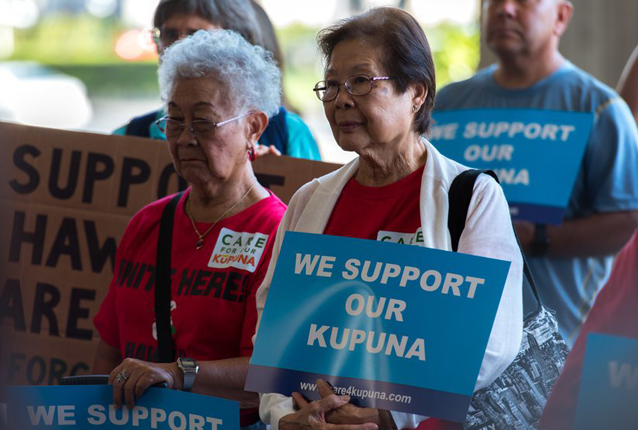We can’t relent in our efforts to unite against corporate CEOs trying to gut our health care and attack our freedom to lead healthy lives and age with dignity. But let’s take a moment to celebrate a milestone in Hawaii for the daughters, sons, spouses and other family members providing critical in-home care for their aging loved ones.
Yesterday Governor David Ige signed a bill (HB607) establishing a landmark program to assist families with their caregiving responsibilities. The novel Kūpuna Caregivers Program will provide up to $70 per day to help cover the various costs of long-term care.
This assistance plan, named after the Hawaiian term for elder, will offer caregivers relief as they juggle work and family. The new fund also fixes one of Medicare’s shortcomings for working families, as the social insurance program does not reimburse for most long-term care costs outside of a nursing facility.
The program’s goal is to keep more people in the workforce while also providing quality care for aging family members. No one should have to choose between their retirement security and caring for their parents as they age. Too often, caregivers, who predominantly are women, have to leave the workforce because the burden of family care is not affordable or sustainable. This challenge led to many small business owners, who can’t afford losing staff, to back Hawaii’s initiative.
Hawaii residents who work 30 or more hours a week outside the home, and who serve as the primary caregivers are eligible to enroll. Participants can use the funds to hire a trained home health aide to tend to their loved one(s) with a chronic or disabling need. The care can range from a few hours or a full day, depending on the needs of the kūpuna and the family caregiver’s work and personal responsibilities. The stipend also can cover the costs of driving an elder to a medical appointment, hiring someone to do household chores or other assistance a caregiver provides.
The Kūpuna Caregivers Program provides a launchpad for achieving universal access to affordable, and quality long-term care—an aim of our Caring Across Generations campaign that Jobs With Justice co-leads with the National Domestic Workers Alliance. Caring Across, in partnership with Faith Action for Community Equity (FACE), invested significant time and resources in crafting and advancing the Kūpuna Caregivers bill. Hawaii activists and residents were instrumental in galvanizing legislators to prioritize the “Care for Our Kūpuna” campaign, through their ongoing presence at rallies and at the state capitol.
Caring Across hopes to catalyze other communities to follow Hawaii’s lead in easing the economic toll of caregiving. Slate reports that “Washington State is considering a bill that resembles” the initial program proposal in Hawaii that would have generated a much larger universal benefit based off a bigger revenue increase. Lawmakers in Maine, Michigan, and Minnesota are exploring other strong solutions to long-term care.
Achieving a caring economy where everyone can thrive requires both quality care and good jobs. Caring Across and its partners in Hawaii now will work with state administrators to ensure that the homecare aides paid through the program receive family-sustaining wages.





$70 a day is not long term care. It sure may help for for most people who will require help with activities of daily living or supervision due to memory loss they need to plan and not, if they can, be dependent on the taxpayer who has limited resources.
Hawaii should join 44 other states in the federal/state Long-Term Care Partnership Program. It would allow those who have an affordable Long-Term Care policy additional asset protection in the event they exhaust their LTC insurance benefits.
In addition, Hawaii can provide tax incentives for those who plan in advance for the financial costs and burdens of aging.
Most people add LTC insurance to their retirement plan well before they retire. This will safeguard assets like their 401k IRA 403b and ease the burdens extended care places on family.
This will also help Hawaii’s budget so less people will end up spending down assets and having to access Medicaid Long-Term Care. This protects Medicaid for those who really need it.
The solution must do more than just this otherwise it is not a solution. http://www.mccannltc.net